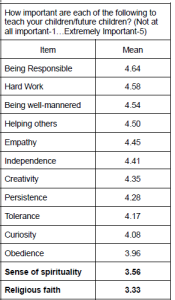This blog post “Communicating Shared Values” is part two of a series designed to spark conversation! To read the previous posts in the series, you can view all ELCA Innovation Blog posts here.
Research Insight: Young adult parents don’t consider religious faith or spiritual development important for their children.
Last week’s blog post shared a call to action from the U.S. Surgeon General for faith communities and religious leaders to play a part in responding to issues around parents’ mental health and well-being in today’s world.
Yet, in a recent research study, survey respondents rated “religious faith” as the least important thing to teach their children when presented with a list of options that included values and behaviors like empathy, helping others, tolerance, and responsibility, which may all feature prominently in Christian teaching designed for children.
With this disinterest in passing on religious faith, how might congregations engage parents and their children? Gallup has reported that religious people experience better well-being in various ways. We should not reduce our faith to being a device or vehicle for health and happiness. Instead, emphasizing the connection between a relationship with God and a life of purpose and vocation deserves an increased focus.
While trust in religious institutions may be waning, 27% of survey respondents still said they would trust religious leaders or texts for parenting advice. This compares to 63% who would trust their parents (by far the most trusted source of advice), 30% who would trust experts or academics, and only 15% who would trust blogs, influencers, or social media. This level of trust is hardly overwhelming, but it does signal an openness to hearing from faith communities about parenting – particularly if that advice helps a parent pass on values and ideals they care deeply about, like a sense of responsibility and empathy for others.
Next steps for congregations
What can faith communities do to support parents as they raise children to live a life of purpose? While there isn’t a singular solution, congregations seeking to promote the well-being of parents can listen intentionally to local families. What needs do parents have that a faith community might have the resources to meet? Where is there alignment between a congregation’s beliefs or practices and the values parents are striving to instill in their children? These are the types of wonderings that spark ideas for creative ministry.
Next week’s blog will focus on spiritual practices among parents and prospective parents. In the meantime, we invite you to reflect on the discussion questions below. If you have comments, questions, or reflections, please share them with us at Lab@elca.org!
Discussion Questions
- Does our congregation or community offer any ministry specifically designed for parents? If not, when was the last time our congregation/community intentionally engaged with parents?
- How might our congregation play a role in connecting caregivers and parents to foster social connection?
- How could we learn more about the biggest challenges facing parents in our community?
- What other non-profits, faith communities, organizations, etc., are providing support for parents in our community? Have we made any connections with them recently?
Further Reading
- Recommended Practices for Lifelong Faith Formation: This ELCA handbook gives concrete, easily accessible touchpoints for faith formation for different age groups.
- 4D Formation: Exploring Vocation in Community: This book by Drew Tucker, an ELCA pastor, explores the definition of Vocation and invites the reader “to examine, clarify, and affirm their purpose and identity, and ultimately to experience God’s presence in and purpose for their lives.”
- Young Adult Parents Research: We’re basing this blog series on this report! The linked report provides analysis and survey results in full.

